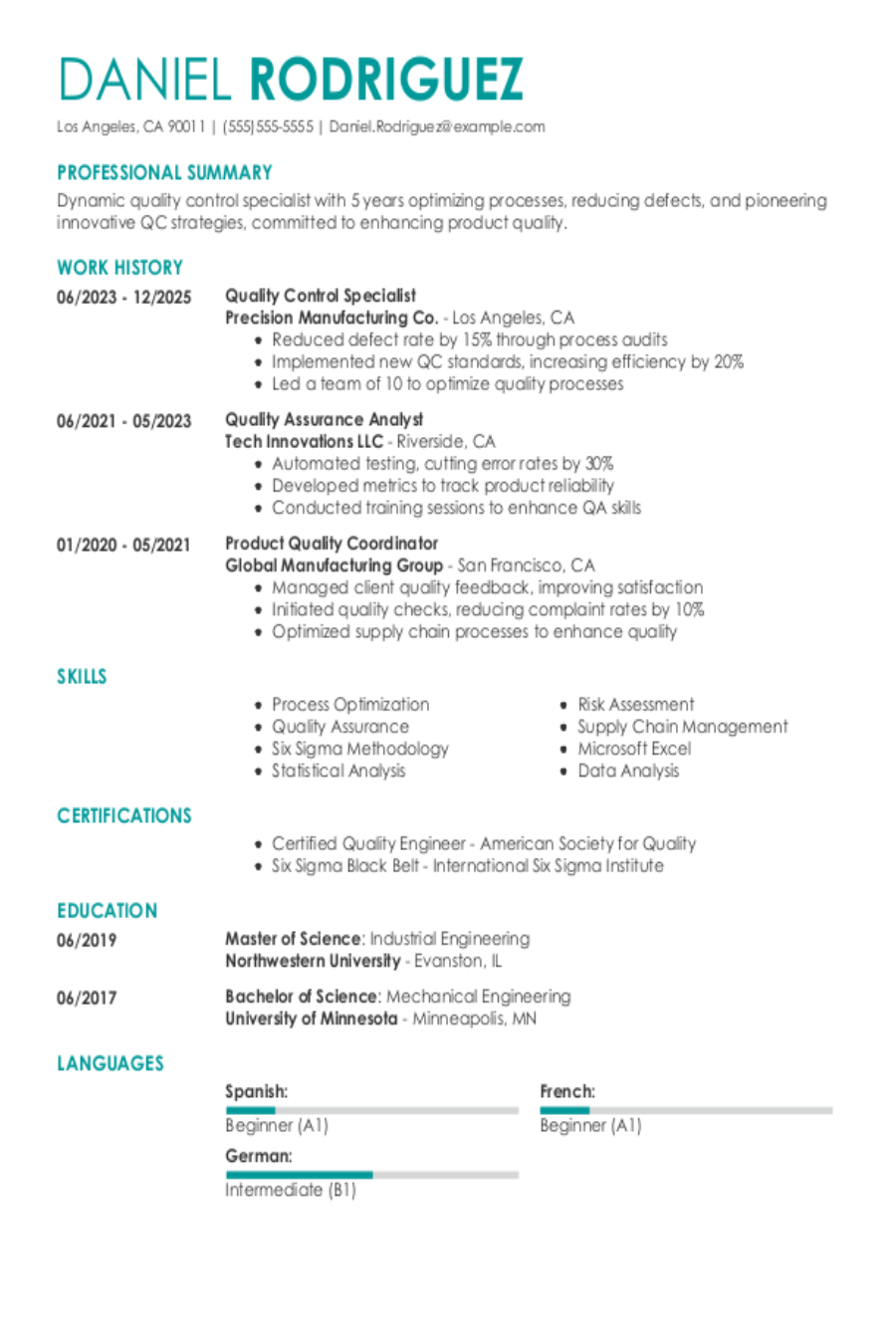Table of contents
Popular Electronics Engineer Resume Examples
Entry-level electronics engineer resume
An entry-level resume for an electronics engineer should emphasize technical skills, relevant projects, internships, academic achievements, and certifications to showcase practical knowledge despite limited professional experience.
Clarity: Choosing a simple resume template helps create a clean and organized document that highlights qualifications clearly, enabling recruiters to quickly assess your fit for the electronics engineering role.
Functional format: Using a functional resume format is strategic for this entry-level electronics engineer as it highlights key skills like circuit design and project management, showcasing relevant competencies over limited work history.
Mid-career electronics engineer resume
A mid-career electronics engineer resume should emphasize a well-rounded portfolio showcasing technical expertise, hands-on project experience, and ongoing learning to demonstrate professional advancement and adaptability in the field.
Neat template: A well-structured resume highlights qualifications clearly, allowing hiring managers to quickly grasp key achievements and skills. This structure helps demonstrate the job seeker's value effectively and efficiently.
Active language: Strong action verbs such as "reduced," "improved," and "led" illustrate a clear initiative and measurable impact, showcasing effective contributions in various engineering roles.
Experienced electronics engineer resume
An experienced electronics engineer resume should emphasize key projects and measurable achievements to clearly illustrate the job seeker's professional growth and contributions to innovative solutions in the field.
Concise professional summary: The resume's opening summary effectively showcases 13 years of specialized experience in electronics engineering, emphasizing a strong history of innovation and efficiency improvements.
Reverse-chronological experience: The chronological resume format clearly highlights the job seeker's extensive experience in electronics engineering, presenting their career progression and achievements in a chronological manner.
No experience electronics engineer resume
A resume for an applicant with no experience should highlight relevant coursework, technical skills, and any hands-on projects or internships to showcase the applicant’s potential and commitment to the field.
Emphasis on professional skills: Emphasizing technical skills highlights the applicant’s ability to excel in electronics engineering, showcasing readiness to tackle challenges despite limited hands-on experience through volunteer roles.
Avoid jargon: Job seekers often feel the need to embellish their experiences with technical jargon or complex phrases, thinking it will impress employers. However, a straightforward and clear description of their responsibilities is far more compelling and shows genuine competence.
More resume examples
Electronics Engineer Resume Template
Kickstart your career with this versatile electronics engineer template. Simply adapt it to showcase your unique skills and experiences in the field.
Aya Martinez
Westbrook, ME 04100
(555)555-5555
Aya.Martinez@example.com
Professional Summary
Experienced Electronics Engineer proficient in signal processing, PCB layout, and embedded systems development. Achieved significant cost reductions and increased system efficiencies through innovative designs.
Work History
Electronics Engineer
Innovatech Solutions - Westbrook, ME
July 2022 - August 2025
- Enhanced signal processing by 25%.
- Redesigned a circuit reducing costs by K annually.
- Led a team to increase efficiency by 30%.
Embedded Systems Engineer
NanoTech Innovations - Portland, ME
May 2016 - June 2022
- Developed firmware reducing boot time by 40%.
- Collaborated on IoT projects increasing reach by 20%.
- Streamlined debugging processes saving K monthly.
Hardware Design Engineer
Circuit Masters Inc. - Portland, ME
July 2014 - April 2016
- Optimized PCB layout improving performance by 15%.
- Reduced manufacturing costs by 12% annually.
- Enhanced device connectivity features by 25%.
Skills
- Analog and Digital Circuit Design
- PCB Layout Optimization
- Embedded Systems Development
- Signal Processing
- Microcontroller Programming
- Hardware Debugging
- IoT Solutions
- Project Management
Certifications
- Certified Electronics Technician - Electronics Technicians Association
- Embedded Systems Certification - Institute of Electrical and Electronics Engineers
Education
Master of Science Electrical Engineering
Elite Institute of Technology Techville, Innovatia
June 2014
Bachelor of Science Electronics Engineering
University of Innovation Innovation City, Invention State
May 2012
Languages
- Spanish - Beginner (A1)
- German - Intermediate (B1)
- Mandarin - Beginner (A1)
Must-Have Skills on a Electronics Engineer Resume
A strong skills section is important for showcasing your expertise in electronics engineering.
The following data highlights the most essential hard and soft skills for an electronics engineer resume based on Resume Now’s internal resume data.
When you’re ready to improve your resume with relevant skills, check out our AI Resume Skills Generator. It provides tailored suggestions for both hard and soft skills aligned with your job title, ensuring you present a comprehensive skill set.
Writing Your Electronics Engineer Resume
Having explored example resumes, you are now prepared to dive into the process of crafting your own. We'll guide you through each section step by step, ensuring you understand how to write a resume that stands out in the competitive field of electronics engineering.
List your most relevant skills
An effective skills section on your electronics engineer resume is important for showcasing your technical expertise and problem-solving capabilities. To ensure it resonates with potential employers, carefully analyze the keywords from the job listing and incorporate relevant terms such as "circuit design," "embedded systems," or "signal processing." These keywords not only catch the eye of human recruiters but also help you navigate past applicant tracking systems (ATS) that filter applicants based on keyword relevance.
Keep in mind when crafting your skills section, you should use both hard and soft skills that highlight your qualifications. Including terms like "team collaboration" or "project management" alongside your technical skills can demonstrate a well-rounded profile.
Example of skills on an electronics engineer resume
- Proficient in designing and developing electronic circuits and systems
- Adept at troubleshooting and resolving technical issues efficiently
- Strong communicator with the ability to collaborate across teams
- Analytical thinker with a keen eye for detail in project execution
Highlighting your soft skills on your resume can set you apart in a competitive job market. Employers often value interpersonal abilities because they are challenging to develop, and showcasing these traits can demonstrate your potential for teamwork and effective communication in the workplace.
Highlight your work history
Your work experience section is where you showcase your accomplishments and demonstrate how you applied technical skills across various projects. Be sure to include specific examples that emphasize your achievements, as doing so can help distinguish you from other applicants employers are considering for results-driven roles.
When detailing each job entry, make sure to specify key information such as your job title, employer name, and employment dates. Providing these details gives context to your career history and makes it easier for employers to verify your background. To further strengthen this section, consider adding certifications or specialized training relevant to the positions you've held.
Example of an electronics engineer work experience entry
- Electronics Engineer
Innovative Tech Solutions - San Jose, CA
June 2019 - Present - Design and develop cutting-edge electronic systems for consumer products, improving performance by 30% through innovative circuit designs
- Conduct feasibility studies and simulations to assess project viability, resulting in a 25% reduction in prototype development time
- Collaborate with cross-functional teams to integrate hardware and software components, improving product reliability and user experience
- Lead troubleshooting efforts for complex electronic issues, achieving a 40% decrease in post-launch defects through rigorous testing protocols
- Mentor junior engineers on best practices in electronics design and project management, fostering a culture of continuous improvement within the team
Quantifying achievements in electronics engineering is essential to highlight your impact on projects. For example, stating that you reduced production costs by 15% while maintaining product quality allows employers to see the tangible benefits of your contributions.
Include your education
The education section of your electronics engineer resume should detail your academic credentials in reverse-chronological order, starting with the most recent degree. Include relevant degrees and certifications while omitting high school diplomas if you hold a bachelor's degree or higher. Emphasizing any honors, projects, or specialized coursework can further improve this section's appeal.
For individuals currently pursuing degrees or having incomplete education, it's important to indicate the highest level achieved along with an anticipated graduation date. You may also include bullet points highlighting significant coursework or academic projects that are relevant to the field of electronics engineering. This is especially useful for new graduates or students as it showcases their foundational knowledge and skills.
Common certifications for an electronics engineer resume
- Certified Electronics Technician (CET) – International Society of Certified Electronics Technicians (ISCET)
- Electronics Engineering Technician (EET) – National Institute for Certification in Engineering Technologies (NICET)
- Certified Reliability Engineer (CRE) – American Society for Quality (ASQ)
- Professional Engineer (PE) – National Council of Examiners for Engineering and Surveying (NCEES)
Sum up your resume with an introduction
The profile section at the top of your resume acts as your first point of contact with employers, establishing your professional brand and showcasing your most relevant qualifications. This brief but impactful introduction can significantly influence whether recruiters invest time in reviewing your full application.
Your decision between a professional summary and resume objective depends on your career stage and the narrative you want to create. Seasoned workers should leverage summaries to present concrete examples of success, specialized knowledge, and measurable contributions from previous roles. Those new to the field or transitioning careers will find objectives more effective for communicating preparation, applicable abilities, and enthusiasm for their target industry.
Professional summary example
Innovative electronics engineer with over 10 years of experience in designing and implementing cutting-edge electronic systems. Demonstrated success in optimizing circuit performance and improving product reliability, resulting in a 20% reduction in production costs. Proficient in embedded systems design, PCB layout, and signal processing, contributing to the development of high-quality consumer electronics that meet stringent industry standards.
Resume objective example
Enthusiastic electronics engineer eager to contribute innovative solutions within a forward-thinking engineering team. Aiming to leverage strong analytical abilities and skill in circuit design and troubleshooting to improve product development processes and drive technological advancements.
Keep your resume profile concise and packed with relevant information. Aim for three or four sentences that highlight only the most critical details about your skills and experiences. For anything beyond that, feel free to elaborate in your cover letter where you can provide a more comprehensive view of your qualifications.
Add unique sections to set you apart
Including optional sections on your resume as an electronics engineer can significantly improve your candidacy by showcasing your unique qualifications. These sections offer you the opportunity to present a fuller picture of who you are beyond just technical skills.
Think about adding details that reflect your professional journey, such as relevant hobbies or volunteer work. For instance, if you enjoy building gadgets in your spare time or have volunteered to teach coding to students, these experiences can highlight both your passion for technology and your commitment to community engagement. Such insights not only demonstrate valuable skills but also reveal the values that drive you as a professional.
Three sections perfect for a electronics engineer resume
- Technical skills: Technical skills are important for an electronics engineer's resume as they showcase your expertise and ability to tackle complex challenges. Highlighting these skills not only demonstrates your qualifications but also makes you stand out to potential employers in a competitive job market.
- Tools and platforms: In today's fast-paced electronics landscape, having computer skills in software and tools is important. Mastering platforms like CAD, simulation software, and coding languages boosts productivity and innovation, making engineers more effective problem solvers.
- Professional certifications: Certifications can showcase your dedication to staying updated with industry advancements. Highlight relevant certifications, their issuing organizations, and completion dates to improve your professional profile.
5 Resume Formatting Tips
- Choose a format that matches your career stage.
When selecting a resume format, consider your experience level. If you're seasoned in the field, using a chronological format that highlights your work history will showcase your expertise effectively. On the other hand, if you’re just starting out or shifting careers, a functional format can emphasize your skills and education instead. A combination resume might also serve well to present both aspects balanced and appealingly.
- Pick a smart resume template.
Why use a resume template? They improve readability and ensures that hiring managers can quickly grasp your qualifications. A well-structured template not only saves you time on formatting but also keeps your content organized in a way that's easily scannable by applicant tracking systems.
- Use an appropriate font.
Opt for a clean, professional font. Fonts like Arial, Helvetica, or Georgia can ensure clarity for both applicant tracking systems and hiring managers alike.
- Use consistent formatting.
Ensure your resume is neatly aligned with uniform margins to present a polished and professional look that appeals to employers.
- Keep your resume to one or two pages.
Resumes should be one page long. Keeping your content concise allows you to focus on the most relevant information about your experience and skills. Although a two-page format may be acceptable if you have extensive experience, clarity should always take precedence.
What’s the Average Electronics Engineer Salary?
Electronics engineer salaries vary based on location, career level, and qualifications.
This data, provided by the Bureau of Labor Statistics, will show you expected salary ranges for electronics engineers in the top 5 highest-paying states, including the District of Columbia. The figures reflect the most current salary data available, collected in 2024.
- Full Range
- Most Common (25th–75th percentile)
- Average
District of Columbia
Most common: $137,610 - $191,880
California
Most common: $117,460 - $198,440
New Jersey
Most common: $121,500 - $198,920
Massachusetts
Most common: $106,240 - $168,700
Maryland
Most common: $120,490 - $174,260
Tools for Your Job Search
Are you gearing up to apply for that exciting electronics engineer position? Before you hit submit, take advantage of our ATS Resume Checker. This essential tool provides insights into how well your resume stands up against the automated systems many companies use for initial job seeker screenings.
Need help crafting a standout resume? Our AI Resume Builder offers tailored recommendations specific to your electronics engineering experience, along with professionally designed templates that effectively showcase your technical skills and achievements.
Frequently Asked Questions
Last Updated: August 23, 2025
Absolutely. A cover letter expands on your resume and serves as an important communication tool with potential employers. It allows you to highlight your enthusiasm for the role and explain how your background makes you a great fit. Don’t overlook this opportunity. Write a cover letter that showcases your unique qualifications.
To simplify the process, consider using our AI Cover Letter Generator, which can help you create a customized, job-winning cover letter in just minutes. You’ll find various cover letter template options that match your resume perfectly, ensuring consistency and professionalism in your application materials.
A resume is a concise document, usually spanning one to two pages, that highlights your key skills and experiences in a brief format. In contrast, a CV (curriculum vitae) can be several pages long and provides comprehensive details about your academic background, research contributions, publications, and extensive professional experience.
You’ll often need a CV for specialized positions in academia, science, law, or medicine. If you're uncertain whether to use a CV or resume for your application, our online CV Maker can assist you in crafting an impressive document quickly. Choose from various CV templates tailored to different industries and career levels to create a standout document that aligns with your job aspirations.
Absolutely, essential skills like "circuit design" and "problem-solving" are important for electronics engineer resumes. Additionally, it's beneficial to review job descriptions for other important keywords and phrases that employers prioritize in this field.
To improve your resume, tailor its content to highlight your relevant skills and experiences. Review job listings to pinpoint specific keywords, then weave them into your resume. This strategy will effectively showcase how your qualifications align with the role you desire, making you a standout job seeker.
An active LinkedIn presence is important for an electronics engineer's job search. Use the platform to expand your professional network, connect with industry peers, and effectively showcase your technical skills and projects to potential employers.
To ace your interview as an electronics engineer, practice answering job interview questions and answers. This preparation not only boosts your confidence but also equips you to handle any surprises that may come up during the conversation. You’ve got this!
Was this information helpful? Let us know!
Hailey is a career advice writer dedicated to helping job seekers excel in their careers.
More resources

15 Latest Resume Trends for 2026 + Examples
In our dynamic global economy the job market and the expectat...

AI-Resistant Careers Index 2026: 20 Jobs That AI Can’t Replace
Resume Now s latest report breaks down the most AI-proof caree...

60% of U.S. Workers Expect AI to Eliminate More Jobs Than It Creates in 2026
Resume Now s newest report shows growing concerns about the im...

Plumbing Resume: Examples & Templates
As a plumbing professional you need a resume that captures th...

Purchasing Resume: Examples & Templates
As a purchasing professional you need a resume that captures ...

Quality Control Resume: Examples & Templates
As a quality control professional you need a resume that high...

